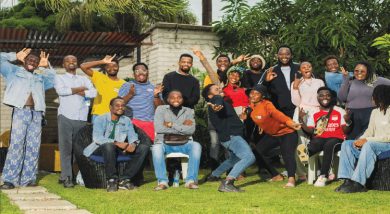Remembering the mighty Paul Chaphuka
There used to be a young man who, in his short life, left a mark on the Malawi music scene. Although his life was celebrated by many after his demise, stories will always be told of Paul Chaphuka, the young man whose album took the music terrain by storm.
However, he did not live to enjoy his individual hard work, for he was called to God’s glory.
The late Chaphuka’s musical journey, according to his good friend Lucius Banda, started in the late 1980s when he had a short stint with Wambali Mkandawire.

Recalls Lucius: “Many of us in Balaka joined Alleluya Band, the group that shaped him. When my brother Paul left Alleluya, Charles Sinetre Paul and I were left to manage it. That was the first time I came face to face with this talented and hardworking young man.
“We performed together in the band under the leadership of Sinetre from 1994 to 1997 where Chaphuka proved his worth as an instrumentalist. But he concentrated much on the rhythm guitar although during his time with Wambali, he played the bass guitar.”
Through the years, Chaphuka curved himself a career out of music. He started working on his first solo album in 1997.
“The band did not allow him to work on his own album and because I was serving my notice after resigning to establish Zembani Band, I helped him by signing him as my very first artist under my stable. And so we worked together on his album Ndichiritseni.
“However, that time, Chaphuka was not feeling well. I remember one day when we were in the studio, he started coughing persistently. We could not continue with the recording as he had to go to the hospital. But that part where he was coughing, formed a fraction of his title track,” recalls Lucius.
The two parted ways, in the hope of meeting the following week to finish the recording. But God had other plans as then, Chaphuka was admitted to Mlambe Mission Hospital in Blantyre. He never came out alive,” according to Lucius.
“He was unwell and we could not go back to the studio. For three weeks he was in the hospital after being diagnosed with skin cancer. He died on May 11 1997,” he evoked fond memories of his friend.
With much of the recording done, Lucius continued with the project, later releasing the album Ndichiritseni, from the moving song in which Chaphuka was asking God to heal him.
Recorded at IY Studios in Balaka and produced by Paul Banda, the album fared well on the market, but at the age of 28, the man behind it was gone for good, leaving a wife and three children.
“What remained was patching up of voices in some of the songs, but a larger chunk was done. It was painful to see how Malawians liked the album. We would think of how best successful he could have been. It was a moment of more sadness,” recollected Lucius.
He brands Chaphuka as a prolific artist who was in class of his own.
“If he were alive up to now, he could have been very far. His main gift was not song writing but singing and playing instruments. He knew how to play almost all instruments.
Paul’s death represents the many artists who have died and continue to die due to poverty. His death was as luck of resources and I am sure, if we had everything, we could have saved him,” said Lucius.
Meanwhile, Chaphuka’s daughter, Cynthia, is collaborating with Stonard Lungu’s son Mumderanji Lungu on a song titled Msozi.
Cynthia is making a first on the music scene with Msozi.
Aged 22 and the first born in a family of three girls, she hopes the song will launch her music career so as to follow her father’s footsteps.
“This is my first time to do music but the plan is to come up with an album which will launch my music career. The idea is to let the legacy of my father live on through his music and my exploits,” she said.
When Chaphuka died of cancer in 1997, Cynthia was only four years old.
But although young, she had been exposed to music well enough to vividly remember what he father used to do.
“I remember my dad taking me to his shows, recording me on radio cassettes as I sing while he played the guitar. Malawi can remember my father through my music as though he is gone.
“His genes were passed on to me musically and biologically as I look a lot more like him. That was the bond we shared musically and other than that, I never went to the saloon because he would retouch my hair and even plait me braids,” she said. n






